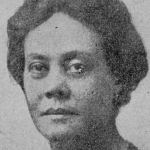There is something in the sound of drum and fife
That stirs all the savage instincts into life.
In the old times of peace we went our ways,
Through proper days
Of little joys and tasks. lonely at times,
When from the steeple sounded wedding chimes,
Telling to all the world some maid was wife—
But taking patiently our part in life
As it was portioned us by Church and State,
Believing it our fate.
Our thoughts all chaste
Held yet a secret wish to love and mate
Ere youth and virtue should go quite to waste.
But men we criticised for lack of strength,
And kept them at arm's length.
Then the war came—
The world was all aflame!
The men we had thought dull and void of power
Were heroes in an hour.
He who had seemed a slave to petty greed
Showed masterful in that great time of need.
He who had plotted for his neighbour's pelf,
Now for his fellows offers up himself.
And we were only women, forced by war
To sacrifice the things worth living for.
Something within us broke,
Something within us woke,
The wild cave-woman spoke.
When we heard the sound of drumming,
As our soldiers went to camp,
Heard them tramp, tramp, tramp;
As we watched to see them coming,
And they looked at us and smiled
(Yes, looked back at us and smiled),
As they filed along by hillock and by hollow,
Then our hearts were so beguiled
That, for many and many a day,
We dreamed we heard them say,
'Oh, follow, follow, follow!'
And the distant, rolling drum
Called us 'Come, come, come!'
Till our virtue seemed a thing to give away.
War had swept ten thousand years away from earth.
We were primal once again.
There were males, not modern men;
We were females meant to bring their sons to birth.
And we could not wait for any formal rite,
We could hear them calling to us, 'Come to-night;
For to-morrow, at the dawn,
We move on!'
And the drum
Bellowed, 'Come, come, come!'
And the fife
Whistled, 'Life, life, life!'
So they moved on and fought and bled and died;
Honoured and mourned, they are the nation's pride.
We fought our battles, too, but with the tide
Because we were not wives
We are dishonoured. Is it noble, then,
To break God's laws only by killing men
To save one's country from destruction?
We took no man's life but gave our chastity,
And sinned the ancient sin
To plant young trees and fill felled forests in.
Oh, clergy of the land,
Bible in hand,
All reverently you stand,
On holy thoughts intent
While barren wives receive the sacrament!
Had you the open visions you could see
Phantoms of infants murdered in the womb,
Who never knew a cradle or a tomb,
Hovering about these wives accusingly.
Bestow the sacrament! Their sins are not well known—
Ours to the four winds of the earth are blown.




















Comment form: